UK’s daily Covid cases fall for SEVENTH day: Infections plummet 50% to 23,511 in biggest drop in months but deaths rise by a third to 131 and hospital admissions climb by a quarter — as Professor Lockdown hints crisis could be over by October
- Coronavirus cases have fallen for seven days in a row amid hopes the third wave has peaked early
- Professor Neil Ferguson suggests that the country will be ‘looking back on’ most of the pandemic by Autumn
- Boris Johnson warned against ‘premature’ conclusions from the improving data and urge ‘caution’ from public
- Policing minister Kit Malthouse appealed for people to be calm saying government waiting for more evidence
Britain’s daily Covid cases have fallen every day for the past week, official figures confirmed today as a top SAGE expert raised hopes that the country could be ‘looking back’ at the pandemic by October.
The Department of Health recorded another 23,511 infections across the UK over the past 24 hours, down by half on last Tuesday. It marks the biggest week-on-week fall in cases since they unexpectedly started coming down last week.
But daily Covid deaths breached the 100 mark for the first time since March with another 131 announced. They are up by more than a third on the number last week.
Latest data showed Covid hospital admissions are also still on the rise, as 945 were recorded on July 22, up a quarter on the previous week.
Scientists have cautioned that the drop in cases could be partially down to a fall in the number of people coming forward for tests. Figures from the Government’s dashboard show that they have fallen by 14 per cent in the last week, compared to cases which have dropped by 31 per cent in the same time.
Boris Johnson desperately tried to dampen rampant optimism about falling Covid cases today, saying people must not jump to ‘premature conclusions’ and the Government will be ‘very cautious’.
But his comments came just hours after ‘Professor Lockdown’ Neil Ferguson — who himself predicted up to 200,000 daily cases by next month — said the UK could be looking back at the pandemic in just two months’ time.
Professor Ferguson suggested the current dip was down to the end of the Euros football tournament and warmer weather allowing people to spend more time outdoors.
He added there would be ‘uncertainty’ into the Autumn, but stressed that the calculations had ‘fundamentally’ shifted because of the vaccines.
Speaking to BBC Radio 4’s Today programme, he said: ‘I’m positive that by late September, October time, we will be looking back at most of the pandemic.
‘We’ll still have Covid with us, we’ll still have people dying from Covid, but we will put the bulk of the pandemic behind us.’
Several SAGE experts said today that they were ‘puzzled’ by the drop in cases which contradicted the group’s modelling which forecasted at least 100,000 cases per day in the Autumn.
While they cannot put their finger on a single reason for the decline, they have suggested it could be down to a combination of ‘Euro 2020 immunity’, the recent heatwave driving people outdoors, the ‘pingdemic’ forcing millions into a de facto lockdown, and schools closing for summer.
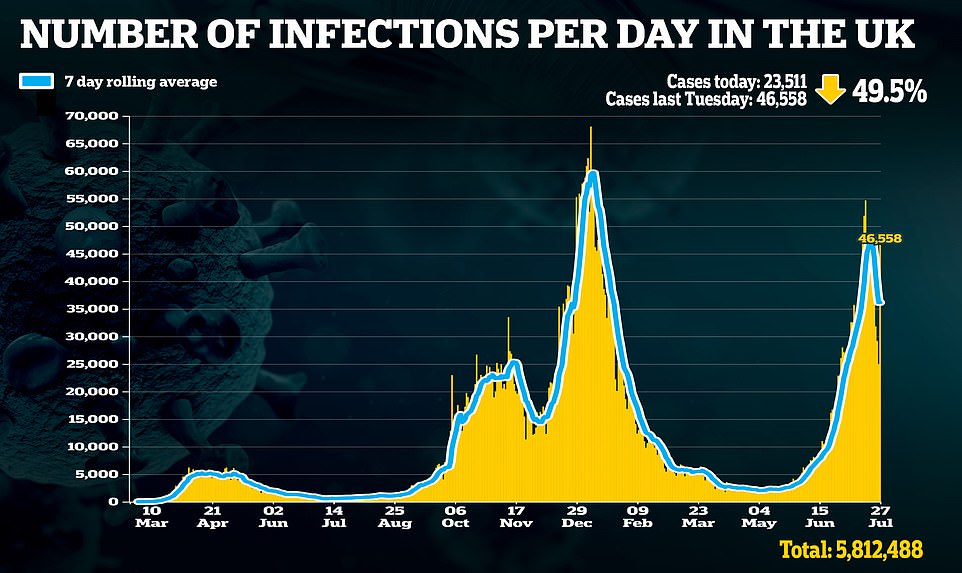
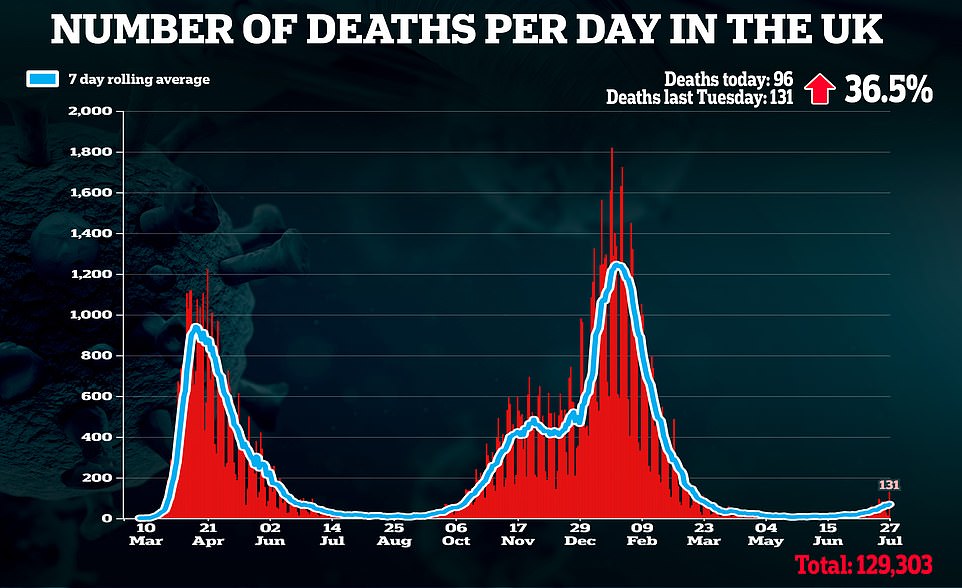
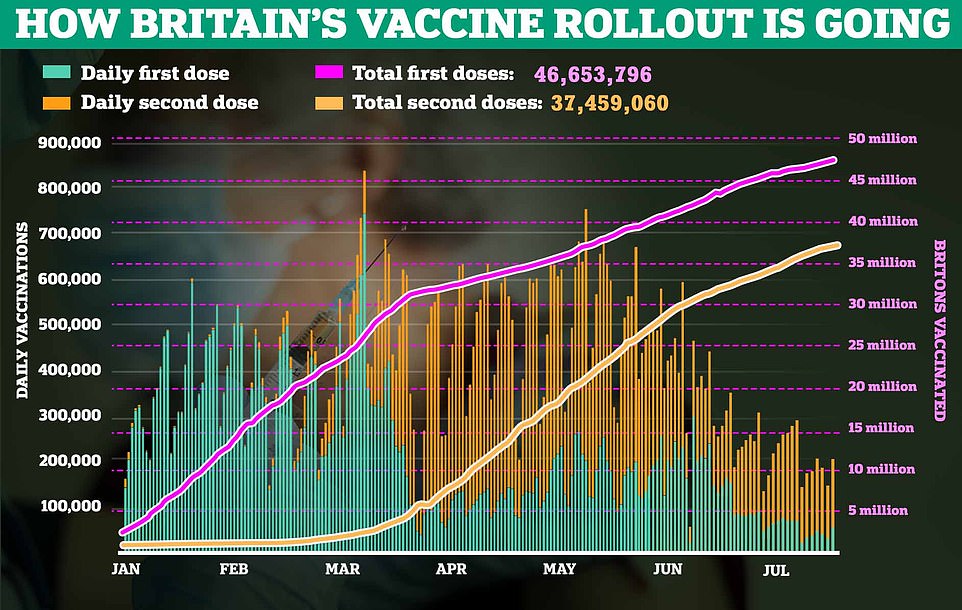
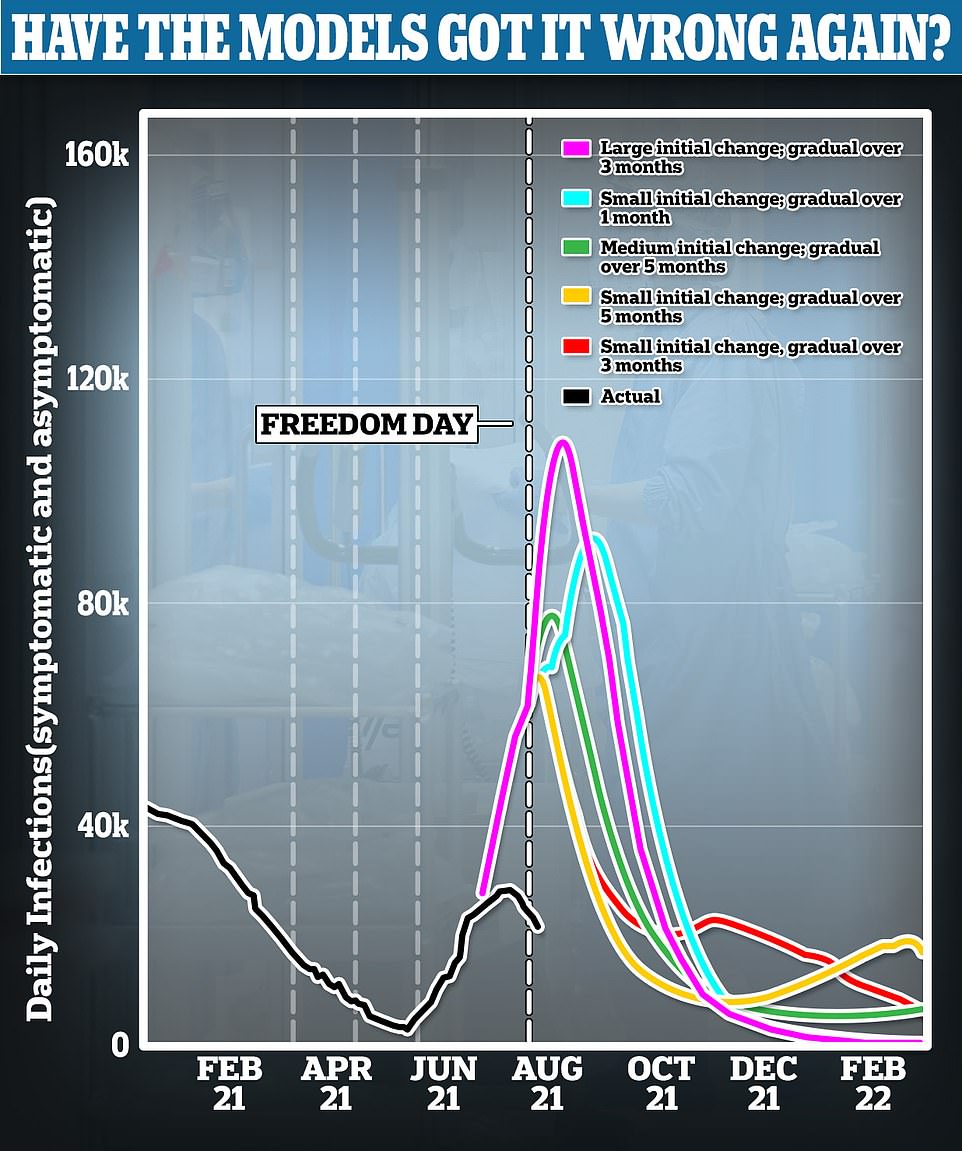
SAGE’s most recent modelling, released little more than a week before the Government eased most remaining Covid restrictions on Monday last week, suggested infections would surge to 100,000 a day by next month (purple line). Graph shows: Warwick University’s predictions, which were listed as SAGE’s central estimates, suggested cases could be as high as 60,000 at this stage of the month and still rising. Britain recorded 24,950 cases yesterday (black line). ‘Initial change’ refers to how quickly people change their behaviour — including mask-wearing, socialising and washing their hands — after restrictions were eased

Scientists say the drop off incases could be caused by schools closing, recent warm weather and Euro 2020 boosting immunity in young people. Graph shows: The drop off in infections in England after the end of Euro 2020. There were signs in early June that cases were falling but during the tournament there was a sustained increased in infections. Experts including Professor Paul Hunter accurately predicted infections would drop off around 10 days after the final — because that is around the time it takes for the effects of increased social mixing to wear off on case numbers
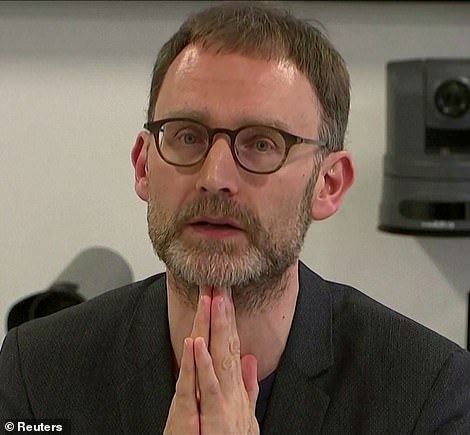
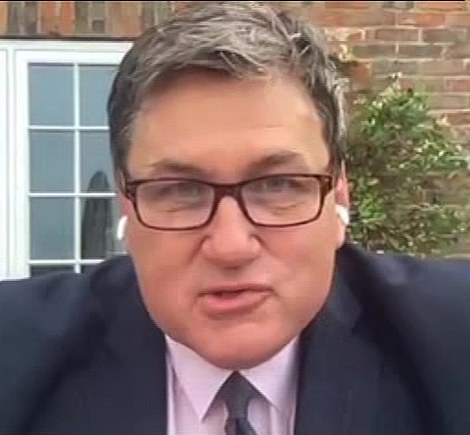
‘Professor Lockdown’ Neil Ferguson (left) today raised hopes that the UK will be ‘looking back’ at the pandemic by September after Covid cases fell for a sixth day running. Policing minister Kit Malthouse (right) appealed for calm insisting the government is ‘waiting’ to see what happens to infections over the coming days
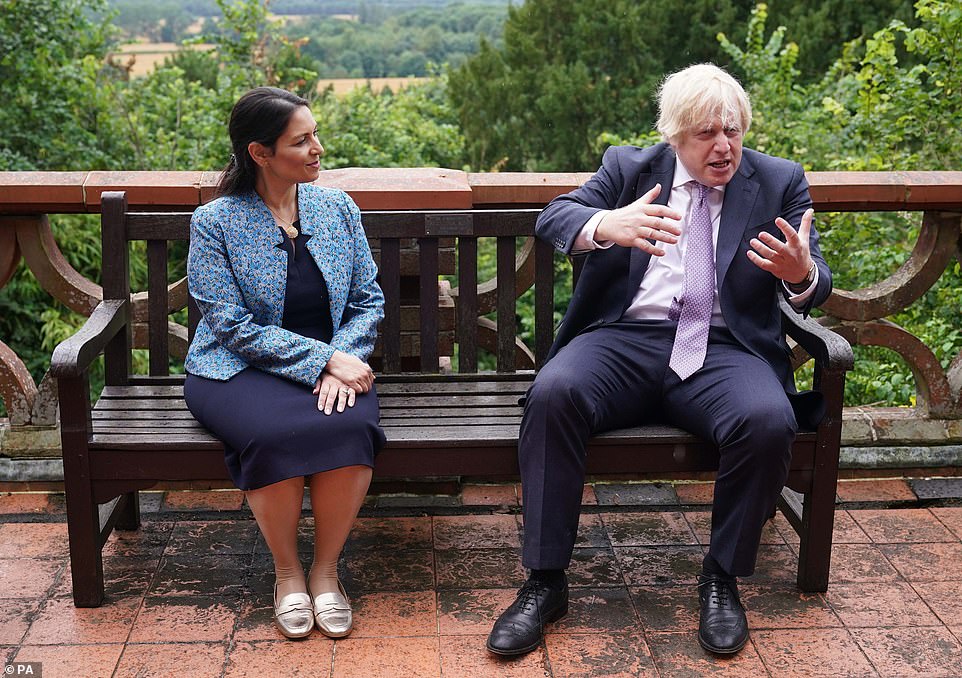
Boris Johnson has emerged from self-isolation today (pictured with Home Secretary Priti Patel) as the government tries to get a grip on what is happening in the coronavirus outbreak
In other twists and turns today:
- A total of 218 fatalities registered in England and Wales in the week ending July 16 mentioned Covid-19 on the death certificate – up 19 per cent on the previous week and the highest since April;
- A minister today voiced frustration after the US said it will not be easing travel restrictions from the UK quickly;
- Another ten countries including Italy, Germany, Canada and Austria could be added to the ‘green list’ from next week in a boost to summer holiday hopes, a leading travel expert has predicted;
- Man terrified of crowds, 33, who ‘wanted to get Covid vaccine’ dies in intensive care after nine-day battle with the virus;
- Pioneering blood test which tells Covid patients how severe their illness will be and gives results in 15 minutes is approved for sale to UK hospitals.
Mr Johnson urged Britons not to ‘run away with premature conclusions’ over the falling case numbers on a visit to Surrey Police HQ, his first public engagement after coming out of self-isolation.
He said earlier today: ‘I’ve noticed, obviously, that we are six days in to some better figures. But it is very, very important that we don’t allow ourselves to run away with premature conclusions about this.
‘Step 4 of the opening-up only took place a few days ago, people have got to remain very cautious and that remains the approach of the Government.’
The Prime Minister also urged Britons to stick to self-isolation requirements, ahead of the launch of test-to-release in mid-August.
The scheme will see self-isolation replaced with daily testing for food workers who are ‘pinged’ by the NHS contact tracing app.
He said: ‘I know that people have been frustrated about the pinging and the self-isolation. I totally understand that, particularly now as we’re starting to see some better figures.
‘But I think everybody understands that this is still a very dangerous disease.
‘We do need to use the tools that we have. Self-isolation is the one that we’ve got. I urge people to do it.’
The new test-to-release system would come in on August 16 but ‘until then, please could everybody stick with the programme’.
Professor Lawrence Young, a virologist at Warwick Medical School, said the drop in case numbers was ‘good news’ but ‘quite a surprise’.
‘On the plus side there is no question that the warm weather has contributed — more mixing outdoors and the virus doesn’t like the sun — as has the increasing number of folk who are fully vaccinated,’ he said.
‘But are these case numbers an accurate reflection of infection levels in the community?
‘The end of term at school means that children are not now undergoing routine twice weekly lateral flow testing and therefore infections in younger people are not being recorded to the same extent.
‘There is also a drop (about 10 per cent) in the number of people taking Covid tests.
‘This could be due to folk not wanting to test positive as it would mean having to isolate and cancelling their summer holiday, missing an important occasion such as a wedding or indeed having to stay home from work.
‘It will be interesting to see what happens to case numbers over the next week to 10 days as we start to see the impact of the lifting of restrictions on July 19 and the new daily testing pilot scheme for key workers kicks in.’
Public Health England’s Medical Director Dr Yvonne Doyle warned daily Covid cases were still high despite the drop over the last seven days.
‘Rates are still high and the pandemic is not over yet,’ she said.
‘Today we have recorded the highest number of deaths since March. This is in part due to the high number of cases recorded in recent weeks.
‘We know deaths follow when there are a high number of cases and data today highlights we are still in the third wave.’
SAGE experts had predicted that daily cases could surge to more than 100,000 a day once restrictions were lifted.
And Professor Ferguson even said a fortnight ago this was ‘almost inevitable’, saying they could actually spiral to double this number.
But Health chiefs have reported falling cases for seven days in a row after they reached just over half of the estimated number of daily infections.
There were 24,950 new cases yesterday, which was a dramatic 38 per cent fall from the 39,950 announced last Monday.
Covid is in retreat across all regions of England, including in hard-hit areas the North East and the North West.
And nationally the current dip marks the first sustained fall in infections outside lockdown since the pandemic began.
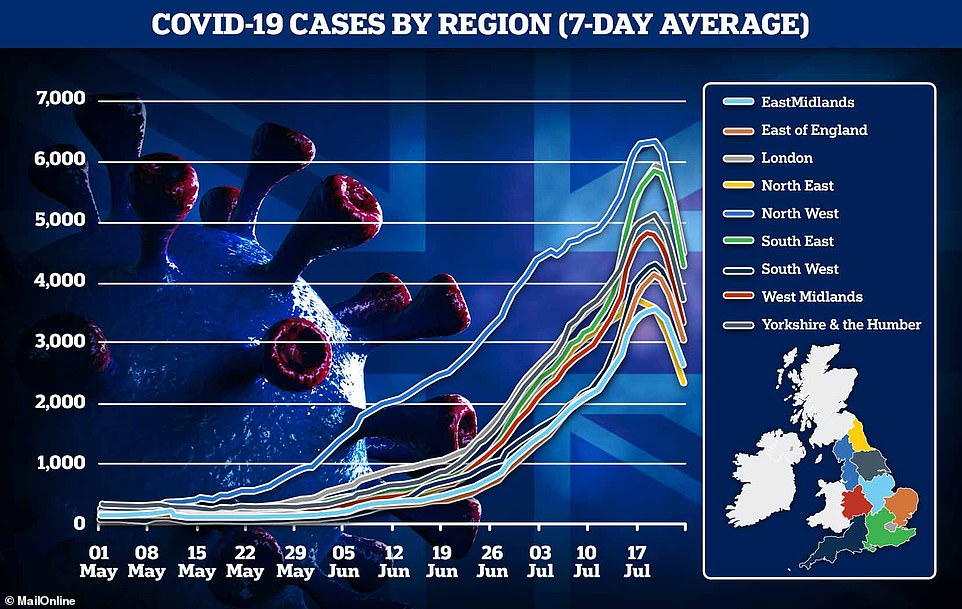
As well as national case rates coming down, the latest regional data from the Government’s coronavirus dashboard appears to show a decline or levelling off in every corner of England. Scientists still don’t know what has caused the sharp fall, but suspect it may be several contributing factors
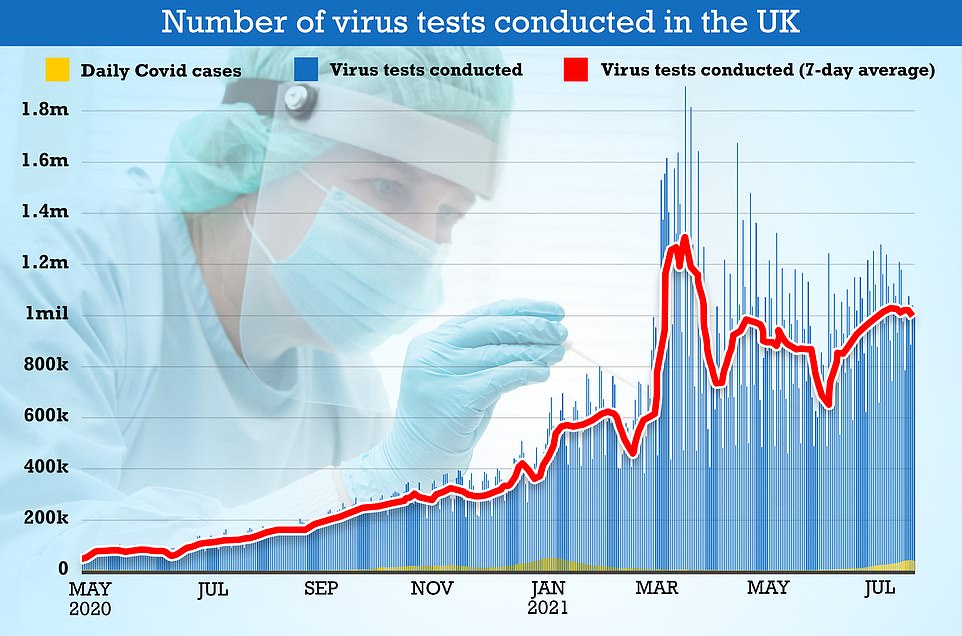
SAGE modeller Dr Mike Tildesley said the fall in cases may be partly the result of a dip in testing. Figures show there were 6.8m carried out in the week up to July 22, down by 350,000 on the previous week (4.9 per cent)
Experts have said the current downturn in infections could be due to the Euro-fuelled Covid surge coming to an end, after people crammed together in pubs and homes creating ideal conditions for the virus to spread.
Others have suggested it could be linked to the school holidays. Pupils have been required to swab themselves for the virus twice a week, but after they broke up last week these tests will no longer be carried out.
Another theory is that the recent heatwave has allowed Britons to spend more time outdoors, making it harder for the virus to spread. But with more rain forecast this factor is likely to change this week.
And the ‘Pingdemic’ may also be curbing the rise in Covid cases, by forcing hundreds of thousands of Britons into de facto lockdown because they have been near someone who tested positive for the virus.
There are also claims that cases are falling because the virus is running out of people to infect amid the successful vaccination drive. Some 46.6million — 88.2 per cent of adults — have got at least one dose and 37.4million — 70.8 per cent — have already received both doses.
But scientists have also warned cases could rise again in the coming days because scientists don’t yet know what impact ‘Freedom Day’ will have on infection levels.
England lifted its final restrictions last week allowing nightclubs to reopen, making face masks advisory and ditching social distancing requirements. There are concerns these could lead to an uptick in cases.
Health chiefs have also warned even a small rise in hospital admissions could put the NHS under strain, potentially requiring another lockdown, because of the record-breaking backlog of patients.
Millions of routine operations including hip replacements and cataract surgery have been shelved since March because of surging Covid admissions. This has created a backlog of more than five million patients, the largest since records began.
Professor Paul Hunter of the University of East Anglia said the fall in cases was likely to be linked to Euro 2020 — and young people getting the disease had made the summer ‘less stressful’.
‘A lot of people might be disgusted by me saying this, but ultimately the Euros might turn out to be one of the things that make the rest of the summer less stressful, as we’ve effectively immunised a lot more younger people who wouldn’t otherwise have come for or been available for a vaccine,’ he told The Times.
‘But I would stress that I would never suggest that as a control strategy in advance.’
Scotland’s national clinical director Jason Leitch said the national team’s early exit seemed to have helped. He pointed out that for a while during the tournament cases among men had outnumbered those among women by ten to one.
‘We had five out of the top 10 local authorities in the UK, now we have none in the top 150,’ he told Today.
‘The Scotland-England game gave us a spike because of travel, not necessarily Wembley. Unfortunately, from a sporting perspective, Scotland went out far too early. But epidemiologically speaking, that probably did us some favours.’
Minister of Justice Kit Malthouse said the Government wanted to ‘communicate the hell out of’ encouraging young people to get a Covid jab.
Speaking on Sky News Mr Malthouse said: ‘We are urging people to get out there and get the jab, and of course tens of thousands of people are every day and that is the other reason to try and urge as many young people as possible to get in there and do so.
‘We know that there is a high prevalence amongst those age groups, we want them to get vaccinated and we will be communicating the hell out of that.
‘Anything you can do to help us, parents, grandparents, friends, whatever it might be to urge young people to go out there and get jabbed will be fantastic.’
Despite the positive signs, NHS chiefs are warning that trusts feel as busy and pressured as they did in January.
Chris Hopson told Times Radio: ‘What’s particularly striking is how much over the last few weeks our trust chief executives have said the pressure and the shape of the pressure is very different in terms of the Covid caseload is much lower.
‘But if you add all of the things we’ve got going on, full pelt on the backlog recovery, we’ve got record demand for urgent care.
‘We have got growing numbers of Covid cases, we’ve then lost about 10,000-15,000 beds of the normal 100,000 beds to ensure we’ve got infection control in place, we’ve got large numbers of staff self-isolating, we do have growing numbers of staff off with stress and we’re now at peak summer leave.
‘What trust chief executives are saying to us is that if you add all of that together and you have a ‘pressureometer’ where you measure the total pressure, what they’re saying to us is in many cases this now feels as busy as it did and as pressured as it did in January.
‘The shape of the pressure just looks very different.’
Adam Finn, professor of paediatrics at the University of Bristol, said: ‘There are certainly multiple factors at play here. These include infection-induced immunity, vaccine-induced immunity and, critically, behaviour.’
He cautioned there were still enough unvaccinated people for infections to rise if efforts to reduce infection risk were not sustained.
But he added: ‘Self-evidently, many people are still making an effort to avoid becoming infected and infecting others, helped by the recent sunny weather that keeps us all outside. With every passing day, another cohort of people, recently immunised, is added to our protection alongside those who have recently had the infection, survived and recovered.’
Professor James Naismith, from the University of Oxford, added: ‘The rollout of vaccines in the UK has clearly made a huge difference to hospitalisations and deaths. The warmer summer days have also helped.’
Modelling had suggested cases over summer could peak at 100,000 to 250,000 a day but infections have been falling since they hit 54,674 on July 17.
Infections have fallen for six consecutive days only once before, on November 18 – and have never fallen for seven days in a row. Professor Naismith added: ‘Many scientists, myself included, expect the end of lockdown to see a rise in cases. However, we have been wrong before and we will be wrong in the future. This is a new disease and we are learning more every day.’
Sir Jeremy Farrar, director of the Wellcome Trust and a member of the Government’s Sage committee, said: ‘If we keep going with the vaccination schedule, if we keep being gradual and cautious through the summer, then I do believe we can avoid [a lockdown] in the fourth quarter of this year.
‘But let’s stop new variants coming in – that’s the biggest risk.’
The latest figures, from July 26, show there were 5,918 Covid patients in hospital – well below the 40,000 at the peak of the previous wave.
The Prime Minister’s spokesman said yesterday: ‘Obviously any reduction in cases is encouraging… but the pandemic is not over and we’re not out of the woods yet.’
It comes as separate figures revealed Covid was now behind more than one in 50 deaths across England and Wales.
An Office for National Statistics report found 218 out of 9,600 deaths had Covid mentioned on their death certificates in the week ending July 16, the equivalent of 2.2 per cent.
This was up by a fifth on the previous seven-day spell, and the most since late April when the second wave was dying down.
Six out of nine English regions saw Covid deaths rise in the most recent week. They plateaued in London and Yorkshire and the Humber, and fell in the East Midlands.
But in a sign of the vaccine effect, Covid is still behind a fraction of fatalities compared to the last time infections were at the same level they are now.
The last time Britain was recording 35,000 daily Covid infections on average there were 8,000 deaths from the virus in England and Wales.
Experts said it was ‘not surprising’ that Covid deaths had risen because infections had previously been surging upwards.
Despite weekly deaths rising last week there are very early signs that fatalities may be slowing down. Yesterday there were 14 Covid deaths, down by a quarter in a week and infections dropped for the sixth day in a row.
And Government figures indicated today that more than half of people labelled as a Covid hospital patient in England only tested positive after being admitted for a different reason.
The NHS England data suggests the pressure of the third wave on hospitals may be even less severe than the daily numbers let on.
There were 827 patients admitted for Covid in England last Thursday, according to the Government’s coronavirus dashboard.
But 56 per cent of these were only diagnosed with the virus after being in hospital for a different illness, with some patients only testing positive weeks later, according to data seen by The Telegraph.
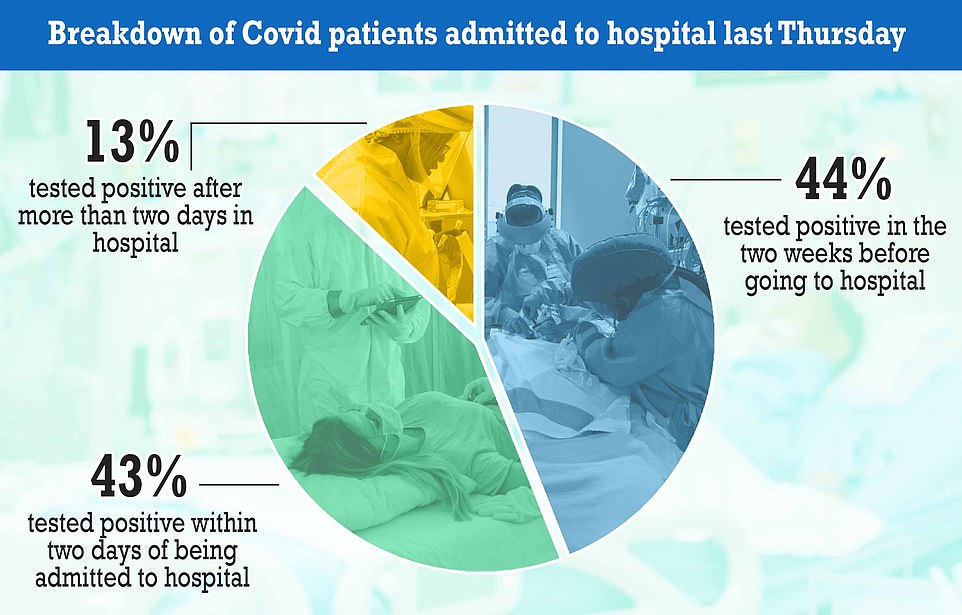
Figures for hospitalisations in England show that just 44 per cent of the 827 people categorised as being hospitalised with Covid last Thursday tested positive in the two weeks before going to hospital. An additional 43 per cent tested positive for the virus within two days of being admitted, while the remaining 13 per cent were found to have the virus after two days in hospital
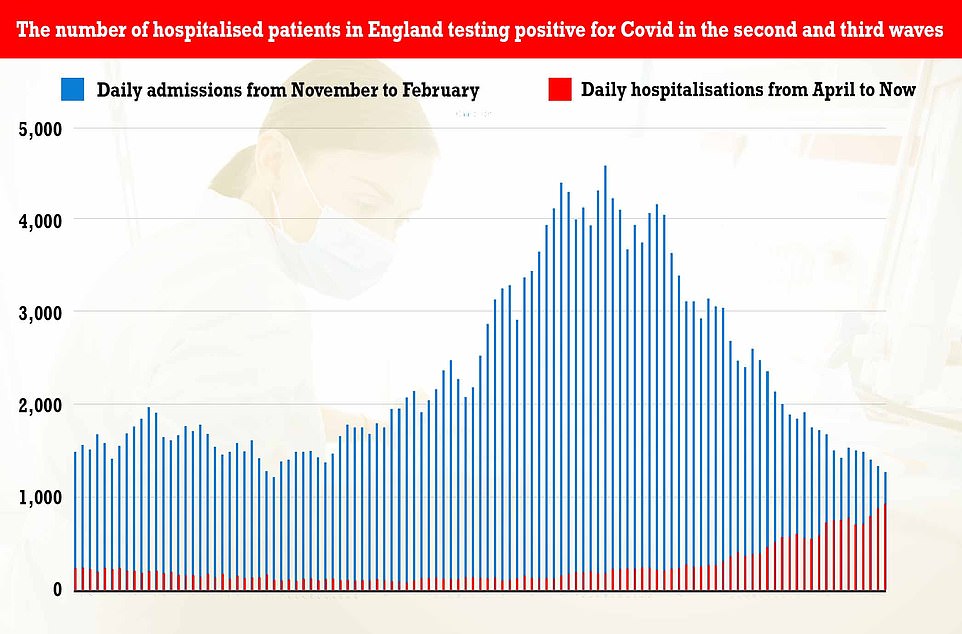
The red bars show the number of patients being admitted to hospitals in England every day up July 20, while the blue bars show hospital admissions during the second wave, which peaked in January when 4,134 went to hospital with Covid in a single day
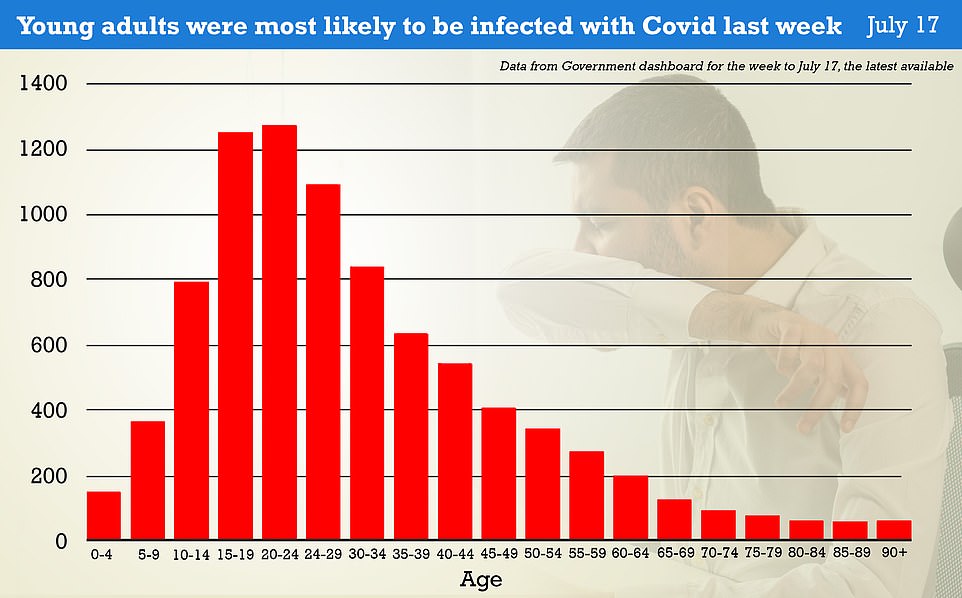
Government dashboard data shows Covid case rates were highest among young adults and school-age children. But they were much lower among the over-80s. It is not yet clear which age group is driving the fall in cases
Experts slammed the finding as ‘misleading’ and said officials must do more to differentiate between actual Covid admissions and ‘incidental’ cases.
It comes after MailOnline’s analysis earlier this month found 40 per cent of Covid ‘admissions’ were in hospital for other reasons.
Tory MPs are now demanding new figures be published every day to paint a clearer picture of pressures on the NHS.
Meanwhile, Mr Malthouse said it was ‘disappointing’ after the White House said curbs will not be loosened, citing concerns about the Delta variant.
In contrast, the UK is expected to announce that double-jabbed Americans will be able to visit without the need to quaratine.
Mr Malthouse told Sky News: ‘Obviously that is for them to assess and we are assessing the likelihood of variants coming in from other countries as well.
‘So, it doesn’t surprise me that they are doing similar. It is obviously disappointing.’
He added: ‘We want to get back to international travel as soon as possible.
‘I have got lots of family overseas who I would love to go and visit, particularly in Canada.
‘I am afraid that the tail-end of this virus, and lets hope it is the tail-end, we are still coping with some of that uncertainty across the world and people will have to bear that in mind as they decide their travel plans or otherwise.’
Why are Covid infections plunging… and will they go up again? We answer the vital questions amid signs pandemic could be easing
By Eleanor Hayward, Health correspondent for the Daily Mail
Ever since Boris Johnson unveiled plans to end lockdown rules, Britons have faced wave after wave of sombre warnings.
New Health Secretary Sajid Javid said cases could reach 100,000 a day. Neil Ferguson of Imperial College London – dubbed ‘Professor Lockdown’ – said it could be 200,000.
Government scientists on the Sage committee said they could not rule out a summer wave of hospitalisations bigger than the winter peak, putting the NHS at risk of collapse.
And Professor Chris Whitty, the chief medical officer, suggested the situation in hospitals could rapidly get ‘quite scary’.
The reality, at least so far, has been rather different. For six consecutive days, cases have dropped – the first time this has happened in months.
Yesterday’s total of 24,950 cases is down 38 per cent from last Monday’s total of 39,950. It is half the summer peak of 54,674 recorded on July 17.
It now seems clear this is a sustained fall. But what is driving it? And is it too soon to say the tide has turned?
VACCINATION
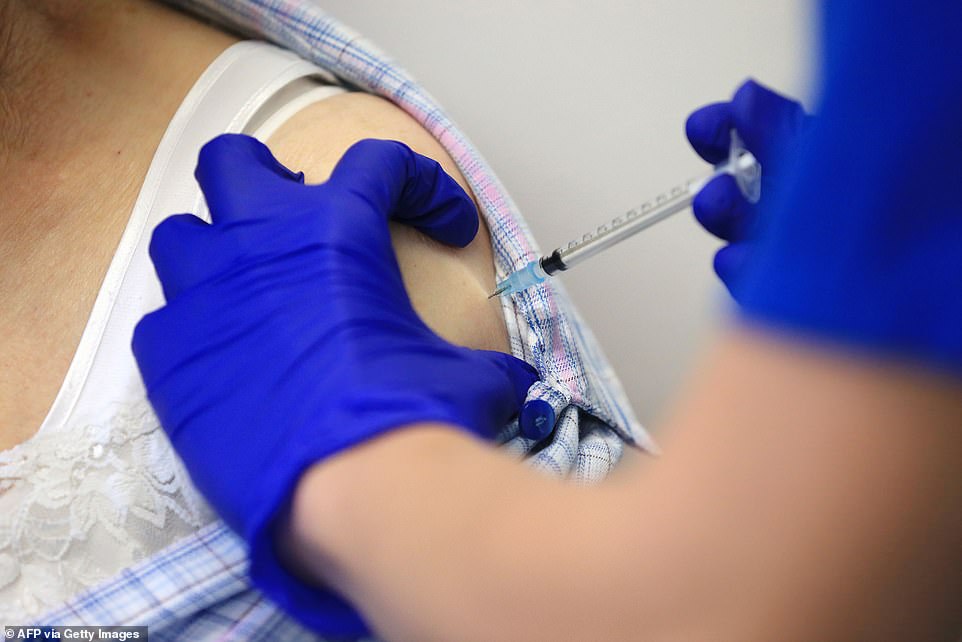
Without vaccines, the UK would probably still be in lockdown. But the jab rollout means the virus now faces a ‘wall of immunity’
Without vaccines, the UK would probably still be in lockdown. But the jab rollout means the virus now faces a ‘wall of immunity’.
Nine in ten adults have had one dose, while seven in ten are double-jabbed. Analysis by health officials suggests the rollout has prevented 7.2million infections in England.
In this respect, the controversial decision to postpone ‘Freedom Day’ planned for June 21 by a month appears to have paid off, as it bought time for millions of Britons to get their second jab.
One dose of the AstraZeneca or Pfizer vaccine is between 30 and 36 per cent effective at preventing a symptomatic Covid infection. But after two doses, that rises to 67 per cent for AstraZeneca and 88 per cent for Pfizer.
The jabs are even more effective against hospitalisation and death. Ultimately, as Professor Adam Finn, from the University of Bristol, says: ‘Vaccination is the only weapon we have that can really snuff the virus out.’
HERD IMMUNITY
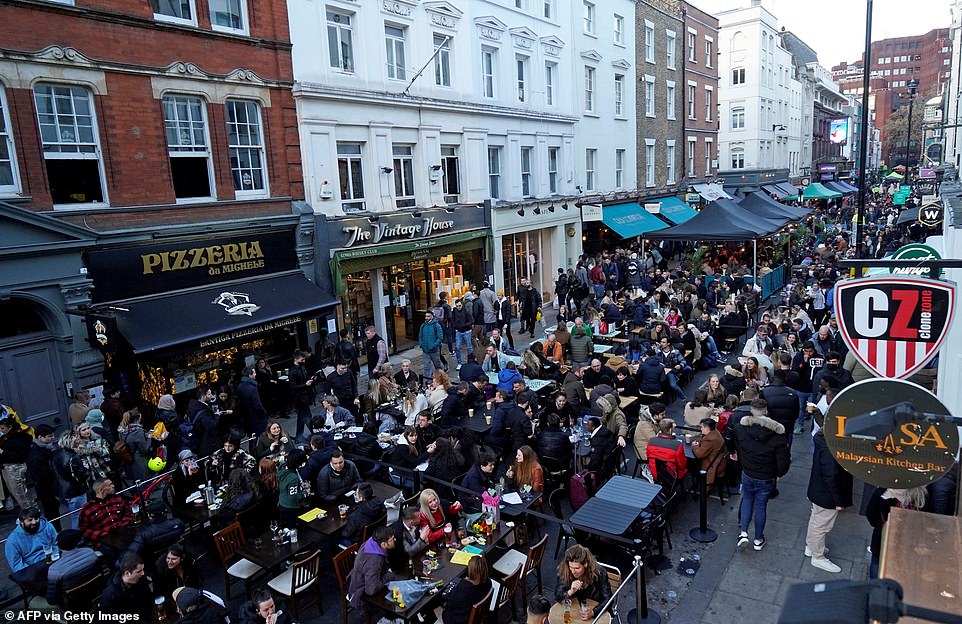
Herd immunity can be achieved either through natural infections or vaccination. The latest data shows nine in ten adults in the UK have antibodies which fight off Covid-19 infection
Once they emerge, diseases rarely leave. Smallpox is the only disease in history to have been successfully eradicated. Most simply fade into the background through the process of herd immunity – when enough of the population are immune, the virus starts to run out of new people to infect.
Herd immunity can be achieved either through natural infections or vaccination. The latest data shows nine in ten adults in the UK have antibodies which fight off Covid-19 infection. But children – who make up one in five of the population – are not being vaccinated, hampering progress towards population immunity.
However, because cases are so high in the young, many have acquired antibodies through infection.
The herd immunity threshold depends on how infectious a virus is. With the Wuhan strain of Covid-19, one infected person passed it to three others, meaning the herd immunity threshold was about 67 per cent.
Because the Indian variant is twice as infectious, the herd immunity threshold is higher – 85 per cent. But Britain may be approaching this point.
SCHOOL HOLIDAYS/TESTING
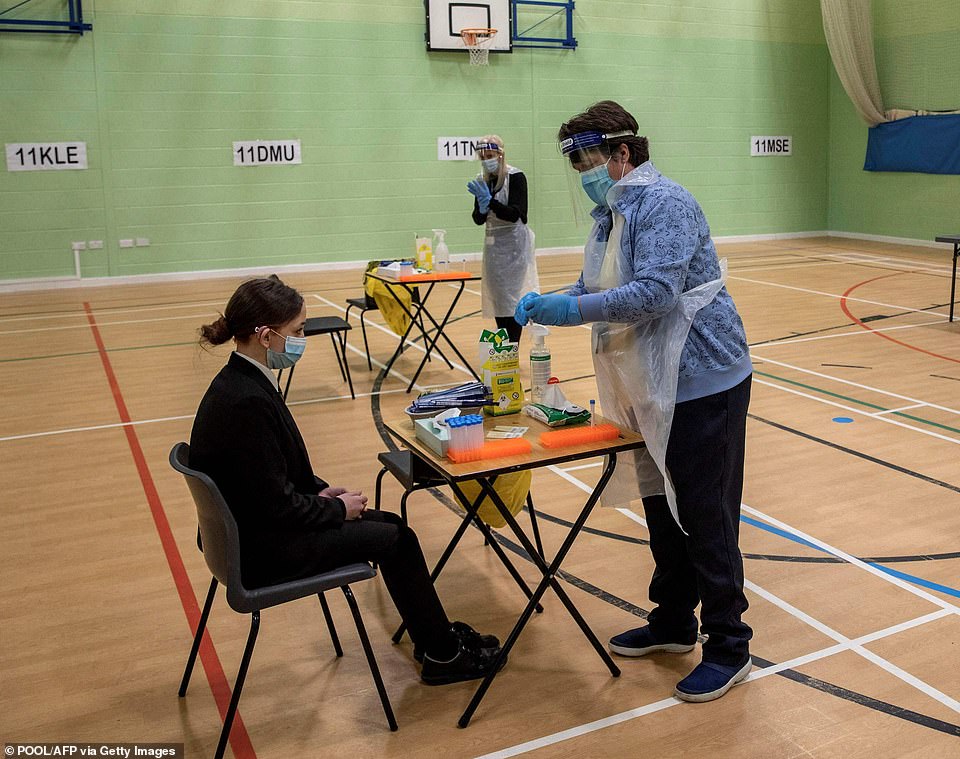
Schools broke up for summer last week, halting the spread of the virus in classrooms. This also led to a drop in testing, as secondary school children are no longer required to do lateral flow tests twice a week
Schools broke up for summer last week, halting the spread of the virus in classrooms. This also led to a drop in testing, as secondary school children are no longer required to do lateral flow tests twice a week.
However, this drop in daily testing cannot entirely explain the vast reduction in cases.
Those who have caught Covid for the second time are not being included in the daily totals, but these reinfections currently make up only around one in 200 positive tests, meaning they would add only a few hundred cases to the daily count.
END OF THE EUROS

Football didn’t come home in the end, but the Euros are thought to have triggered a significant surge in cases as millions gathered indoors to cheer on Gareth Southgate’s side
Football didn’t come home in the end, but the Euros are thought to have triggered a significant surge in cases as millions gathered indoors to cheer on Gareth Southgate’s side.
In the two weeks to July 11 – when England lost to Italy in the final – cases almost doubled. For the first time since the pandemic began, a significant gender gap emerged, with men in their 20s by far the most likely group to test positive.
Scientists say this may have been a blessing in disguise as it ‘effectively immunised a lot more younger people who wouldn’t otherwise have come for or been available for a vaccine’.
WEATHER

Summer provides a ‘natural firebreak’ against the virus as people gather outdoors where it rarely spreads
Summer provides a ‘natural firebreak’ against the virus as people gather outdoors where it rarely spreads.
Before the storms of the weekend, Britain had enjoyed a sustained period of hotter, sunnier weather which may have contributed to the decline in spread.
However, officials fear that Covid could return with a vengeance when it gets colder, taking advantage of cosy indoor gatherings with poor ventilation. Scientists warn that the UK is facing a ‘triple threat’ of flu, Covid, and resurgent respiratory viruses this winter.
PINGDEMIC
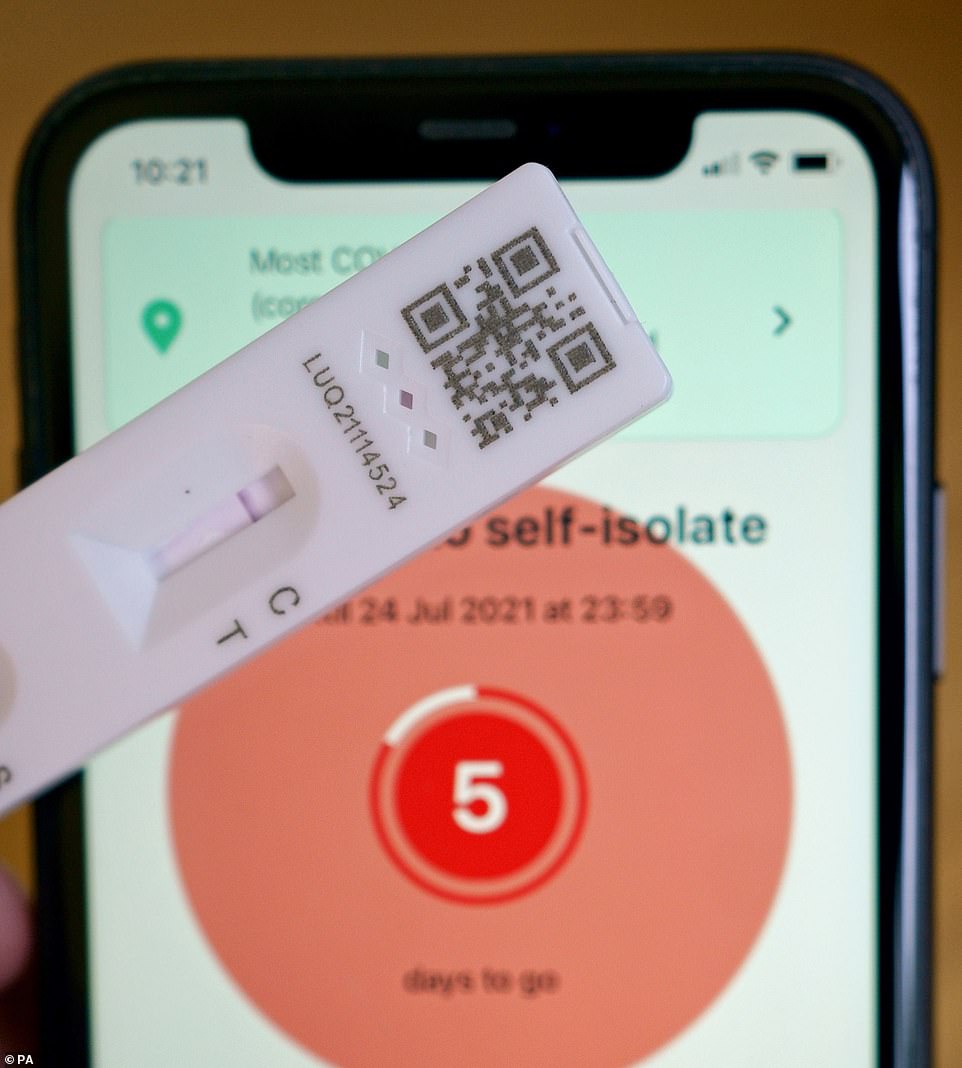
It may have ground the economy to a standstill, but the ‘pingdemic’ has also effectively placed millions in lockdown once again, cutting the spread of the virus
It may have ground the economy to a standstill, but the ‘pingdemic’ has also effectively placed millions in lockdown once again, cutting the spread of the virus.
Dr Stephen Griffin, from the University of Leeds, said the huge numbers self-isolating ‘could have a direct impact upon transmission’.
The public also appear to have heeded warnings from scientists and are taking things much more cautiously than before the pandemic.
Many are still working from home and measures such as wearing masks on public transport have helped to control the spread of the virus.
BUT IT’S NOT OVER YET…
FREEDOM DAY
Scientists say we won’t know the impact of ‘Freedom Day’ on infection levels until the end of this week. Scrapping compulsory face masks and allowing mass gatherings are all likely to have increased spread among young people.
It means the bleak predictions of 100,000 cases a day may still be realised.
HOSPITAL PRESSURES
Despite warnings from Sage, it seems unlikely Covid admissions will get close to January levels – when there were nearly 40,000 in hospital.
But health chiefs have warned that even a small rise in hospitalisations could put the NHS under severe strain, potentially requiring another lockdown.
Last night NHS Providers, which represents hospital trusts, said the health service was already as stretched as it was in January.
Boris scrambles to get Tories back on track as he emerges from self-isolation – after polls showed Labour gaining ground during ‘pingdemic’ shambles
Boris Johnson is scrambling to get the Tories back on track as he emerges from self-isolation today with polls showing Labour gaining ground during the ‘pingdemic shambles’.
Surveys have provided evidence of the PM’s advantage over Keir Starmer narrowing, after Covid cases surged and legions of people were forced to self-isolate.
Research by Redfield & Wilton Strategies found the gap has tightened from nine points to just four points in a week.
There have also been worrying signs in other polls – with Opinium suggesting approval of the government’s handling of the crisis has slumped by 10 points in a fortnight.
Mr Johnson is attempting to turn the focus on to his crime-fighting agenda today, pledging to tag more offenders and make them clean up the streets.
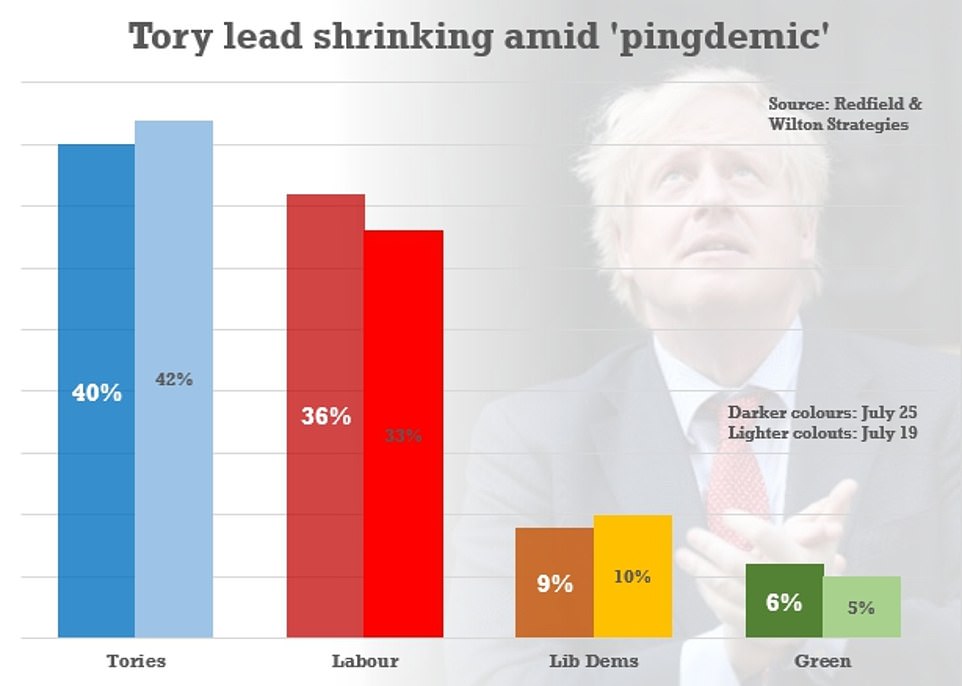
A poll by Redfield & Wilton Strategies found the gap between the Tories and Labour has tightened from nine points to just four points in a week

Mr Johnson (pictured at Surrey police HQ with Priti Patel today) is attempting to turn the focus on to his crime-fighting agenda, pledging to tag more offenders and make them clean up the streets
MPs fear the ‘pingdemic’ has been hammering the government’s popularity, as contacts of positive cases are ordered into house arrest even if they have been fully vaccinated.
Mr Johnson himself was forced to quarantine at his Chequers residence for 10 days after Health Secretary Sajid Javid contracted the disease.
The situation was not helped when the PM and Chancellor Rishi Sunak initially tried to wriggle out of the self-isolation edict by claiming they were part of a pilot scheme.
Key workers are now being exempted from the rules amid warnings of food shortages, and the system is due to be replaced with daily testing from the middle of next month.
Sir Keir has been looking increasingly confident since seeing off a Tory challenge in a nailbitingly-close by-election in the Red Wall seat of Batley & Spen.
The Labour leader said last week that he believes the ‘road will run out’ for Mr Johnson as the public believe in ‘integrity, honesty and accountability’.
He claimed Mr Johnson had been ‘lucky’ due to the pandemic, with the Government able to address fears over the virus and job security through the vaccine programme and the furlough scheme.
But with most people now jabbed and the furlough scheme winding down, Sir Keir suggested the public’s attention will turn to other aspects of the PM’s record.
He pointed to disquiet over ‘government by soundbite’ and ‘mounting promises that are just broken’ on issues including the Northern Ireland Protocol, the size of the army, overseas aid, tax and social care.
